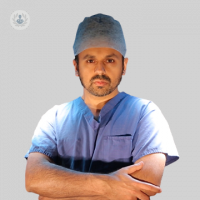Glaucoma and eye stents
Written by:Glaucoma is a progressive condition affecting the eyes, which, if left untreated, can cause the patient to lose their sight. Can you have glaucoma without realising it? And could titanium eye stents be a solution? Expert ophthalmologist Mr Imran Masood has the answers.

The eye is filled with a fluid called the aqueous, which helps the eye keep its shape and transports nutrients to the lens. This fluid enters and drains from the eye in a cycle. However, if the fluid cannot drain properly, the pressure inside the eye (intraocular pressure) rises. This increased pressure can damage the optic nerve, and therefore the person’s vision. This is how glaucoma works. Damage to the optic nerve is irreversible.
Can you have glaucoma without realising it?
Unfortunately, yes. Glaucoma doesn’t usually display any obvious symptoms until it is too late, first affecting the peripheral vision (the sides of the field of view). It is often called “the silent thief of sight”. It can be difficult to detect without an eye test.
How can I protect my eyesight?
The best way to catch glaucoma early, as well as protect your eye health in general, is to have regular eye tests. This is more important the older you get, with patients over 60 getting free check-ups on the NHS. Those with a family history of glaucoma are eligible for free eye tests from the age of 40.
I have been diagnosed with glaucoma. What happens now?
Although the damage caused by glaucoma cannot be undone, the condition can be brought under control to slow down the progression of the disease and preserve eyesight. It is crucial to get the intraocular pressure under control as soon as possible. The first line of treatment tends to be prescription eye drops, which are administered daily, usually 1-3 times a day. Some patients may need more than one type of eye drop. You should always follow your doctor’s instructions with regards to medication.
The downside of eye drops is that the patient will be using them for the rest of their lives. It requires commitment and concentration to stick to a regimen of applying eye drops consistently several times a day, every day, and this is even more inconvenient if the type of eye drops prescribed need to be refrigerated. Worse still, some patients suffer reactions to drops, with their eyes becoming red, dry, and/or sore.
Luckily, there is an alternative solution: minimally invasive glaucoma surgery (MIGS).
What is MIGS?
In the past, surgery was a last resort for the most serious glaucoma cases, but the last decade has seen minimally invasive glaucoma surgery leap forward in terms of refining the techniques and improving the safety and efficacy of the procedure. Performed under local anaesthetic, MIGS can potentially reduce the need for eye drops.
One type of MIGS that is particularly effective at treating open-angle glaucoma (the most common variant of the disease) is the iStent inject® implants – tiny titanium tubes implanted into the natural drainage pathway of the eye, creating a bypass through the blockage.
Are titanium stents in the eye safe?
Yes, the stents are completely safe. They can be implanted during cataract surgery, killing two birds with one stone. According to one study, 72% of patients treated with iStent inject® implants were able to come off glaucoma medication completely after a year’s time.
For more information or to book an appointment, visit Mr Masood’s Top Doctors profile.


